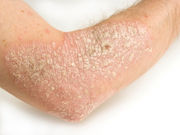Ustekinumab more effective than three tumor necrosis factor-α-inhibitors at six, 12 months
FRIDAY, April 22, 2016 (HealthDay News) — For patients with psoriasis, ustekinumab is more effective than tumor necrosis factor-α inhibitors, according to a study published in the May issue of the Journal of the American Academy of Dermatology.
Bruce E. Strober, M.D., Ph.D., from the University of Connecticut Health Center in Farmington, and colleagues compared therapeutic responses among patients from the Psoriasis Longitudinal Assessment and Registry (PSOLAR) initiating infliximab, adalimumab, or etanercept versus ustekinumab. At six and 12 months, the authors assessed the proportion of patients achieving a Physician Global Assessment score of clear/minimal (0/1) and percentage of body surface area with psoriasis.
Efficacy data were available for 2,076 new users: 1,041 ustekinumab, 116 infliximab, 662 adalimumab, and 257 etanercept. The researchers found that the likelihood of achieving a Physician Global Assessment score 0/1 was significantly lower for patients receiving tumor necrosis factor-α inhibitors versus ustekinumab (odds ratios: 0.396 for infliximab, 0.686 for adalimumab, and 0.554 for etanercept at six months; odds ratio: 0.449 for infliximab at 12 months). A significantly greater mean decrease in percentage of body surface area with psoriasis was seen for ustekinumab versus adalimumab and etanercept at six months and for ustekinumab versus infliximab and etanercept at 12 months.
“In PSOLAR, effectiveness of ustekinumab was significantly better versus all three tumor necrosis factor-α inhibitors studied for the majority of comparisons at six and 12 months,” the authors write.
Several authors disclosed financial ties to pharmaceutical companies, including Janssen, which manufacturers ustekinumab and funded the study.
Copyright © 2016 HealthDay. All rights reserved.








